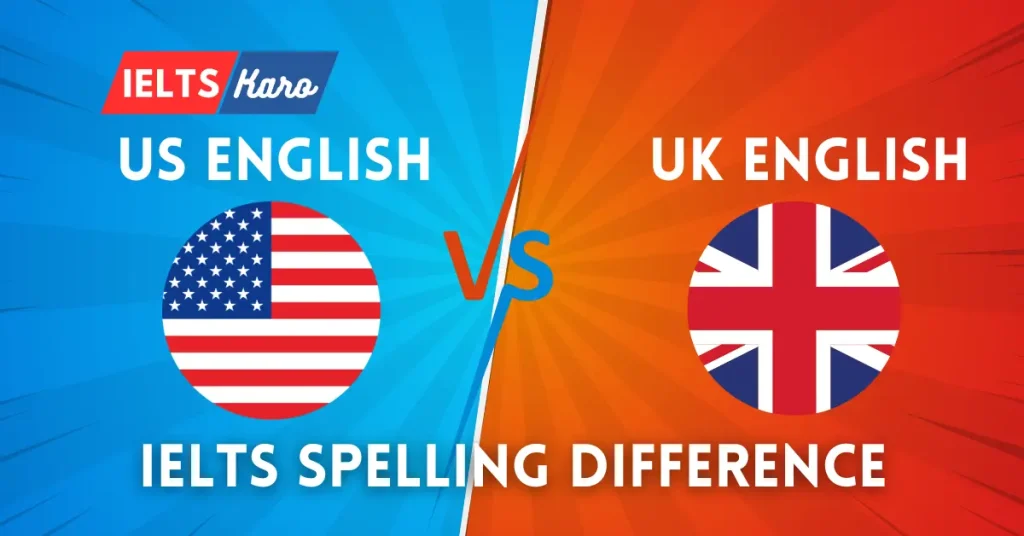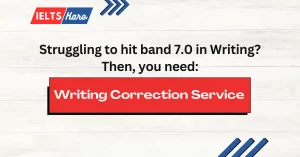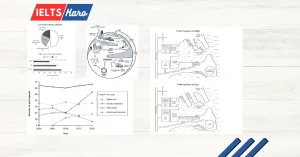Color or colour? Labour or labor? Organize or organise?
Confused, right? Not sure which spelling to use?
Guess what? Both variations are correct. One is the US spelling, whereas the other is the UK variant.
But you’re preparing for the IELTS Writing, which one should you choose? Hint: Focus on just one writing style, as mixing up two variations can confuse the examiner, resulting in potentially lower band score. Stick either with the American (US) or British (UK) English and be consistent in your writing.
Common Spelling Differences Between US and UK English
The list below shares some of the most common words used in IELTS Writing Academic and General Task 1 and 2. Please note that this isn’t an exhaustive list, however, it should give you a good idea of spelling differences.
Here’s an expanded list of common words with different spellings in UK and US English:
| UK English | US English |
|---|---|
| Colour | Color |
| Centre | Center |
| Metre | Meter |
| Litre | Liter |
| Programme | Program |
| Analyse | Analyze |
| Organise | Organize |
| Realise | Realize |
| Travelled | Traveled |
| Cancelled | Canceled |
| Jewellery | Jewelry |
| Neighbour | Neighbor |
| Favourite | Favorite |
| Honour | Honor |
| Labour | Labor |
| Defence | Defense |
| Licence | License |
| Practise | Practice (verb) |
| Practise | Practice (noun) |
| Grey | Gray |
| Grey | Gray |
Which Spelling Should You Choose for IELTS?
Both are acceptable, but not simultaneously. Use any one that you prefer and just use it throughout your writing.
- -or vs -our
Words ending in “-or” in US English often end with “-our” in UK English.
- Examples:
- US: color, honor, labor, behavior, favorite, neighbor, humor, flavor
- UK: colour, honour, labour, behaviour, favourite, neighbour, humour, flavour
PS: The word “hour” retains its spelling.
- -ize vs -ise
US English uses “-ize,” while UK English accepts both “-ize” and “-ise,” although “-ise” is more common.
- Examples:
- US: organize, realize, apologize, criticize, standardize, recognize, characterize, authorize, specialize
- UK: organise, realise, apologise, criticise, standardise, recognise, characterise, authorise, specialise
- -yse vs -yze
Words ending in “-yse” are in UK English and “-yze” in US English:
- Examples:
- US: analyze, paralyze, catalyze
- UK: analyse, paralyse, catalyse
- -er vs -re
Some words ending in “-er” in US English end with “-re” in UK English.
- Examples:
- US: center, meter, theater
- UK: centre, metre, theatre
- -se vs -ce
US English uses “-se” for certain nouns, while UK English uses “-ce.”
- Examples:
- US: defense, license, offense
- UK: defence, licence, offence
- Dropped “e” in US English
Words ending in “-ogue” in UK English often drop the “ue” in US English.
- Examples:
- US: dialog, catalog
- UK: dialogue, catalogue
- Double Consonants in Suffixes
UK English tends to double consonants when adding suffixes like “-ing” or “-ed,” while US English often does not.
- Examples:
- US: traveling, canceled
- UK: travelling, cancelled
- Single vs Double “L”
In UK English, some words retain the double “l” where US English uses a single “l.”
- Examples:
- US: enrollment, fulfill
- UK: enrolment, fulfil
Common Words That Differ in US and UK English
- Program (US) vs Programme (UK)
- Check (US) vs Cheque (UK)
- Pajamas (US) vs Pyjamas (UK)
- Practice (noun) vs Practise (verb in UK English)
Tips for Avoiding Spelling Mistakes
- Learn the Rules: Familiarize yourself with the common spelling differences listed above.
- Read and Practice: Read essays or articles written in the English variant you prefer.
- Proofread: Always double-check your work for spelling consistency before submitting.
All right, that’s it for now. Should I find more words, I’ll keep on updating them in this blog. Cheers 😉





